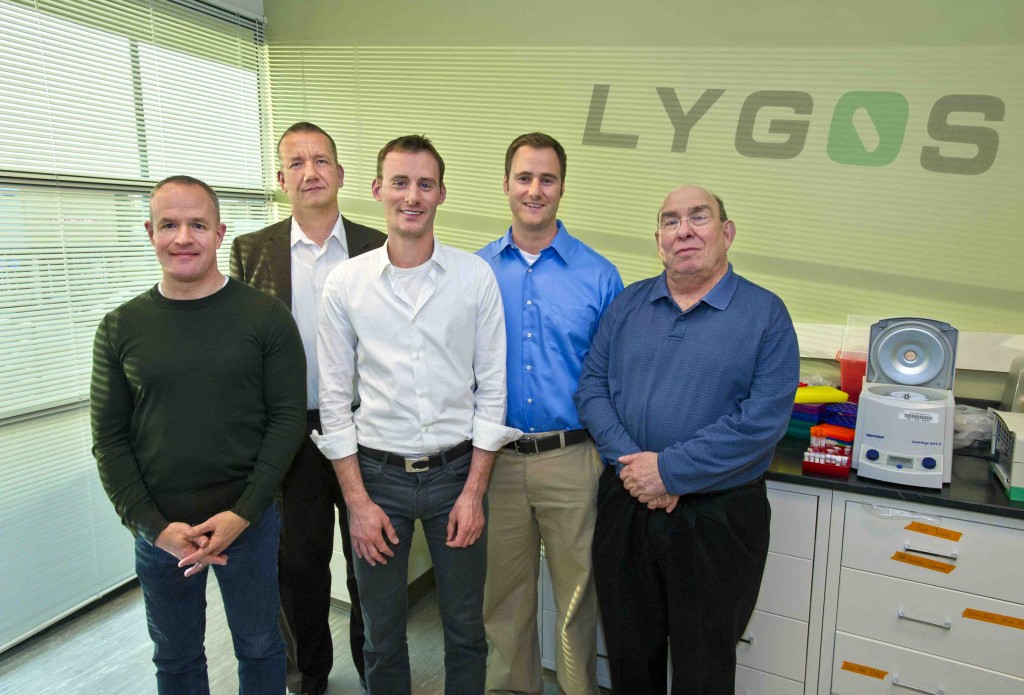Petrochemicals are found in thousands of everyday products, from clothing to food preservatives to plastics. Imagine if many of those chemicals could be made without petroleum and instead with biological processes. Using the tools of synthetic biology scientists at the Department of Energy’s Joint BioEnergy Institute (JBEI) have done just that, and now a startup company has been formed to commercialize the technology.
Lygos is the first company to spin out of JBEI, a Department of Energy research center established in 2007 to pursue breakthroughs in the production of cellulosic biofuels. The five company co-founders include Jay Keasling, director of JBEI and a world authority on synthetic biology and metabolic engineering who holds joint appointments with the Lawrence Berkeley National Laboratory (Berkeley Lab) and the University of California (UC) Berkeley.

Lygos cofounders Jay Keasling, Clem Fortman, Jeffrey Dietrich, Eric Steen and Leonard Katz (Credit: Roy Kaltschmidt/Berkeley Lab)
The process uses sugar as a feedstock, which is metabolized by designer microorganisms to yield any of a number of molecules. “This is the future of chemical manufacturing,” said Lygos CEO Jeffrey (Clem) Fortman, one of the company co-founders and also a JBEI researcher. “Oil is becoming expensive, and at some point it will be depleted. Sugar is getting more expensive, but it’s still lagging way behind oil.”
The Lygos technology repurposes a class of proteins that have been used for decades to make antibiotics and other drugs. Polyketide synthases (PKS) are a family of multifunctional enzymes that produce polyketides, hydrocarbon chains that serve as a backbone for many widely used natural and synthetic organic chemicals. The JBEI researchers redesigned the PKS process, or pathway, by mixing and matching genetic information to produce compounds that were never made by nature but have become the ubiquitous synthetic materials of our everyday lives.
The method can produce compounds such as nylon precursors, polyester components, styrene and propylene. The latter two are widely used in plastics and countless consumer products. Besides producing products currently made with petroleum, the Lygos technology can also be used to engineer products with characteristics that have never been achieved before, or that have been too expensive to produce otherwise. Biofuels are another possible product.
Although other companies are using biological processes to make certain compounds, what’s superior about Lygos’ technology is that it is a platform as well as a process, theoretically allowing for a huge number of molecules. PKS are composed of discrete modules, each catalyzing the chain growth of a single step. Synthesis of a desired compound can be programmed by selection and genetic manipulation of PKS.
“It’s a broad array of things we can make; estimates are in the tens of thousands, or even higher, of different molecules we could potentially make,” said Fortman. “However the mass market compounds are far fewer than that.”
The company has achieved production of a number of petrochemical replacements at laboratory scale. It is currently optimizing the production of its first target compounds.
Removing petroleum from chemical manufacturing would remove the risk of producing the level of greenhouse gases, hazardous waste and environmental pollution that is associated with production of petrochemicals. The Lygos process is nonpolluting and promises to be nearly carbon neutral. Although bioprocesses do generate carbon dioxide, because more feedstock is planted—in this case, sugar—atmospheric carbon dioxide is captured by the plants. By contrast, in the case of petrochemicals, hydrocarbons are pulled from the ground and emit carbon dioxide when combusted.
The other three company cofounders are Leonard Katz, Eric Steen and Jeffrey Dietrich. Steen, Dietrich and Fortman all started as UC Berkeley graduate students and postdoctoral fellows at JBEI. Dietrich now works full-time for Lygos. Katz is research director at the Synthetic Biology Engineering Research Center (SynBERC), an NSF-funded program within UC Berkeley.
Lygos is not the first startup for Keasling. Also using tools of synthetic biology, Keasling found a way to engineer artemisinin, a powerful anti-malaria drug. That technology was licensed by Emeryville, California-based Amyris, of which Keasling is a cofounder. He is also a cofounder of LS9, a biotechnology company based in South San Francisco, California.
Lygos has raised a small amount of capital from private sources and also has a Department of Energy grant; the company is actively fundraising and is currently located at the QB3 East Bay Innovation Center in Berkeley, California.
“As we get better at optimizing the process, the number of things that we can make that will be cost-competitive with petroleum is just going to keep growing,” Fortman said.
# # #
JBEI is one of three Bioenergy Research Centers established by the DOE’s Office of Science in 2007. It is a scientific partnership led by Berkeley Lab and includes the Sandia National Laboratories, the University of California campuses of Berkeley and Davis, the Carnegie Institution for Science, and the Lawrence Livermore National Laboratory. DOE’s Bioenergy Research Centers support multidisciplinary, multi-institutional research teams pursuing the fundamental scientific breakthroughs needed to make production of cellulosic biofuels, or biofuels from nonfood plant fiber, cost-effective on a national scale. For more visit www.jbei.org.
Lawrence Berkeley National Laboratory addresses the world’s most urgent scientific challenges by advancing sustainable energy, protecting human health, creating new materials, and revealing the origin and fate of the universe. Founded in 1931, Berkeley Lab’s scientific expertise has been recognized with 13 Nobel prizes. The University of California manages Berkeley Lab for the U.S. Department of Energy’s Office of Science. For more, visit www.lbl.gov.